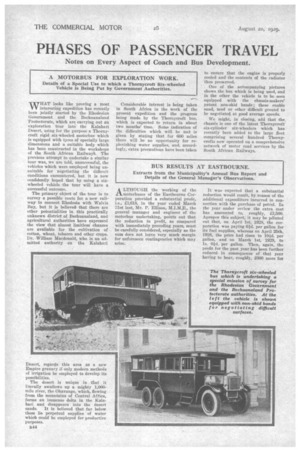PHASES OF PASSENGER TRAVEL
Page 70

If you've noticed an error in this article please click here to report it so we can fix it.
Notes on Every Aspect of Coach and Bus Development.
WAT looks like proving a most HAT expedition has recentlybeen jointly Started by the Rhodesian Government and the Bechuanaland Protectorate, which are carrying out an exploration tour into the Kalahari Desert, using for the purpose a Thornycroft rigid six-wheeled motorbus which is equipped with tyres of specially large dimensions and a suitable body which has been constructed in the workshops of the South African Railway. The previous attempt to undertake a similar tour was, we are told, unsuccessful, the vehicles which were employed being unsuitable for negotiating the difficult conditions encountered, but it is now confidently hoped that by using a sixwheeled vehicle the tour will have a successful outcome.
The primary object of the tour is to survey a possible route for a new rail-way to connect Rhodesia with Walvis Bay, but it is believed that there are other potentialities in this practically unknown district of Bechuanaland, and agricultural authorities have expressed the view that almost limitless. chances are available for the cultivation of cotton, wheat, tobacco and other crops. Dr. William Macdonald, who is an admitted authority on the Kalahari
Desert, regards this area as a new Empire granary if only modern methods of irrigation be employed to develop its possibilities.
The desert is unique in that it literally swallows up a mighty 1,000mile river, the Okavango, which, flowing from the mountains of Central /Mica, forms an immense delta in the Kalahari and disappears into the desert sands. It is believed that far below them lie perpetual supplies of water which could be employed for productive purposes. Considerable interest is being taken in South Africa in the work of the Present expedition and the progress being made by the Thornycroft bus, which is expected to return in about two months' time. Sotue indication of the difficulties which will be met is given by stating that for 600 miles there will be no opportunity for replenishing water supplies, and, accordingly, extra precautions have been taken to ensure that the engine is properly cooled mid the contents of the radiator thus preserved.
One of the accompanying pictures shows the bus which is being used, and in the other the vehicle is to be seen equipped with the chassis-makers' patent non-skid bands; these enable sand, mud or other difficult ground to be negotiated at good average speeds.
We might, in closing, add that the chassis is one of the latest Thornycroft six-cylinder six-wheelers which has recently been added to the large fleet comprising several hundred Thornycrofts now operated on a comprehensive network of motor road services by the South African Railways.




















































































































